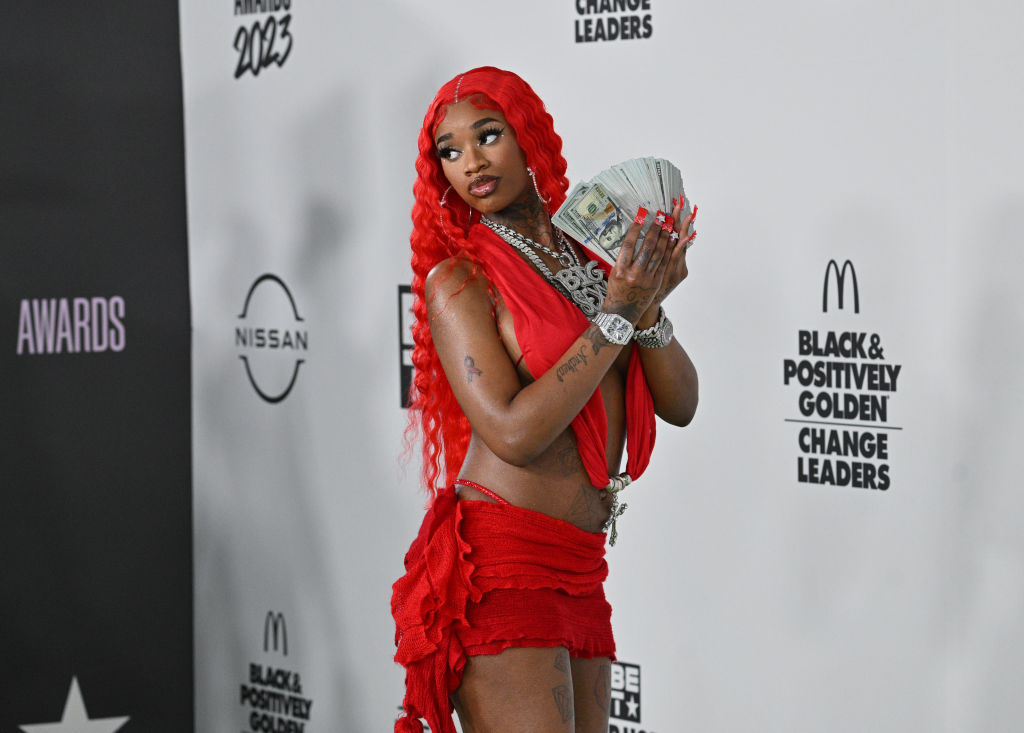
Source: Prince Williams / Getty
One Black male influencer opined on women’s business — and a pregnant Sexyy Red was the target.
Social media personality and author Jeremy L. Holloway took to Instagram Nov. 9 to condemn the “image” of Black women in society after viewing a clip of Sexyy Red throwing ass on stage. In the short snippet that the online personality shared, the pregnant female rapper was in a revealing red outfit and clapping her behind on stage to her viral song “Pound Town.” Amid her booty popping, she also did a split on stage.
“We’re failing as a Black community — if not already failed. At what point are we going to start being honest?” Holloway asked after the short clip of the 25-year-old pregnant rapper played.
“Just show me the other Black women too. If y’all are going to show me this type of Black woman, please give me the others. Show me the ladies,” he stated. “Baby, you can be a freak behind closed doors, but goddamn. We’re lost, bro — as a community, there’s no coming back. As a community, we’re done. This is crazy, [maybe] I’m just too old.”
Holloway argued that the issue regarding Black women’s “image” in society didn’t solely fall on Sexyy Red, whose real name is Janae Nierah Wherry. The online male personality asserted that in the heightened cancel culture of today’s world, no one got “canceled” for “the negative image of Black women.”
“It’s not just her. It’s across social media — look across the TV networks,” he stated.
In a follow-up post, the male influencer said he “sincerely” didn’t “give a damn” about people criticizing his commentary on Sexyy Red’s performance.
After emphasizing that he wasn’t solely targeting the musician and how she displayed herself onstage, the YouTuber said, “Why is it that this image of the Black woman is the one that’s pushed the most?… They push the ratchet Black woman the most like that’s the only image of Black women. For the people who aren’t around different types of Black women, Sexyy Red is what they think Black women are — and that’s not it.”
Halloway also argued that there’s too much representation of Black women with BBLs who wear hair extensions and only go outside with makeup on.
The YouTuber went as far as to claim those criticizing him — assumably Black women — didn’t recognize his “protection” because they never had father figures.
Holloway’s words on the female rapper add to a larger Black manosphere that discusses, attacks and degrades Black women online. Names that come to mind include DJ Akademiks, Fresh And Fit podcast hosts Myron Gaines and Walter Weekes and the late Kevin Samuels.
For all the time Holloway spent framing Sexyy Red as a contributor to and pawn of what he deems is a “negative” image of Black women, the social media personality could have just quickly used his platform to uplift whatever type of Black women he feels like aren’t getting deserved attention. He has over 294,000 followers on Instagram, 1.8 million on Facebook and 359,000 subscribers on YouTube. Moreover, much of his content is reactionary posts to the sayings and doings of Black women.
If Sexyy Red herself isn’t the problem, as he repeatedly claimed, why didn’t he specifically target the social media outlets he said are only circulating one image of Black women? Conversely, why didn’t he use his time to promote outlets that he thinks post various Black women?
If he doesn’t know any outlets that do the latter, why didn’t he base his video solely on that void and leave Sexyy Red out of it?
For as much as Holloway argued that society is pushing the image of one type of Black woman, isn’t he also capitalizing on those same Black women on social media by using their relevancy to make his points?
Sexyy Red has the right to be seen — just like Holloway and everybody else.
It’s not her responsibility to be a reflection of what all Black women are because that image doesn’t exist. We are all different. We are allowed the right to our autonomy and how we choose to present it. It is not Sexyy Red’s fault if people’s social media algorithms only show them Black women “like” her. No person is ever one thing, and how she displays herself on stage doesn’t mean that’s all there is to her.
Protecting all Black women looks like ensuring they have the right to autonomy and multiplicity.
It’s important to check judgment and respectability politics at the door.
RELATED CONTENT: “The Myth of the High Value Male Is A Scam”



